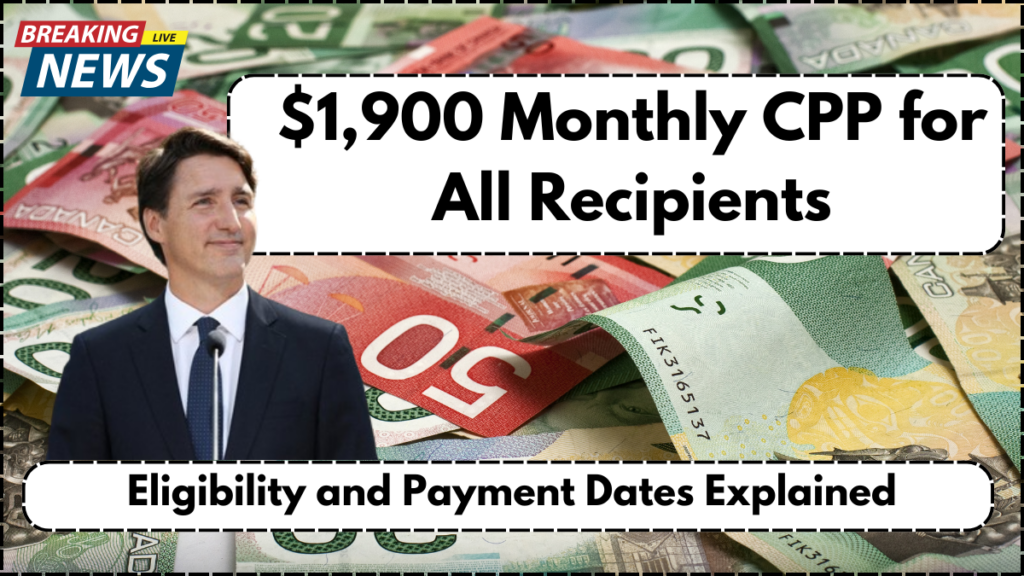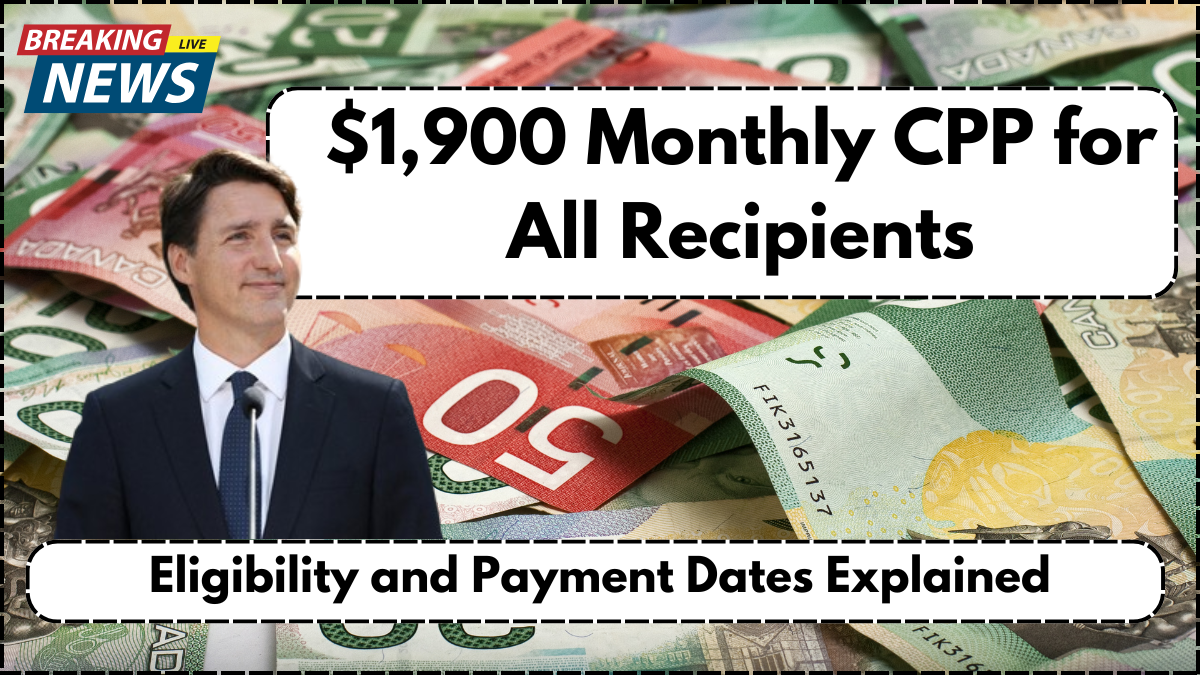In April 2025, the Canada Pension Plan (CPP) remains a vital source of income for Canadians planning for retirement. However, there has been significant public debate about the possibility of a $1,900 monthly CPP payment. While this amount has been circulating on social media and various forums, it has not been officially confirmed by the Canadian government. To clarify, the maximum monthly CPP retirement benefit in 2025 is set at $1,433. This article breaks down the facts about CPP benefits, eligibility criteria, and common myths surrounding potential relief payments or adjustments.

Key Dates and CPP Payments in April 2025
As Canadians anticipate their pension payouts, it’s essential to understand the official details surrounding the CPP payment schedule. In April 2025, the official CPP payout date is set for April 28th, 2025. The maximum monthly retirement pension is $1,433, with amounts varying depending on the contributor’s work history, retirement age, and other factors. Despite rumors of payments reaching $1,900 per month for all recipients, government sources have dispelled these claims.
Understanding CPP Eligibility in 2025
Age Requirement
To qualify for the CPP payments in April 2025, individuals must meet the age criteria set by the Canada Revenue Agency (CRA). Typically, the standard age for receiving full CPP benefits is 65. However, Canadians can start their pension as early as age 60, albeit with a reduction in the monthly payout for each month before age 65.
Valid Contribution History
A key factor in determining CPP eligibility is having a valid contribution history. Canadians must have contributed to the plan during their working years, with deductions taken directly from their wages by employers. For self-employed individuals, the responsibility to contribute is shared between the worker and the employer. The total amount a person can receive in CPP benefits is directly linked to the amount they have contributed over time.
The $1,900 Monthly CPP Payment: A Myth?
The idea of a $1,900 monthly CPP payment has gained attention in certain online communities and discussions. However, this claim is not supported by any official sources. Let’s explore the facts:
Maximum CPP Payment in 2025
As per the most recent updates, the maximum CPP payment available to individuals retiring at age 65 in 2025 is $1,433 per month. This figure is calculated based on the average of a person’s highest earning years and their contributions to the pension plan.
Average CPP Payment
In contrast to the maximum payout, the average CPP payment is significantly lower. In late 2024, the average monthly payout for new recipients was around $808.14. It is important to note that most Canadians will receive less than the maximum amount, as the size of their monthly pension depends on their lifetime earnings and contributions.
Debunking the $1,900 Claim
The rumors about the $1,900 payment likely stem from confusion or miscommunication about potential relief programs, which might offer supplementary payments for low-income seniors or those in particular circumstances. However, CPP itself does not include a flat $1,900 monthly payment. Canadians should focus on strategies to maximize their existing CPP benefits rather than rely on unfounded claims.
How Is CPP Benefit Calculated?
Your CPP payment is influenced by several key factors:
Contribution History
The more you contribute to the CPP throughout your career, the higher your pension benefit will be. The CPP system is designed to reward long-term contributors, with higher contributions leading to higher monthly payouts in retirement.
Average Earnings
The amount you earn over your lifetime also plays a critical role in determining your CPP benefit. The Canada Pension Plan aims to replace up to 25% of your average pensionable earnings, subject to the Year’s Maximum Pensionable Earnings (YMPE). This cap is adjusted annually to account for inflation and wage growth.
Retirement Age
Your decision about when to begin receiving CPP can significantly impact the amount you receive. Here’s how retirement age affects your monthly benefit:
-
Early Retirement (Before 65): Retiring early results in a reduced payout. For each month you begin receiving CPP before age 65, your monthly benefit decreases by 0.6%. For example, if you retire at age 60, your CPP benefit will be reduced by 36%.
-
Delayed Retirement (After 65): On the other hand, delaying your retirement until after age 65 results in an increased monthly benefit. For each month you delay receiving CPP up until age 70, your monthly benefit increases by 0.7%. By delaying until age 70, you could increase your CPP benefit by 42%.
Tips for Maximizing Your CPP Benefits
Maximizing your CPP benefits requires strategic planning. Here are some key steps to ensure you get the most out of the program:
-
Maximize Contributions: Ensure that you make the highest possible contributions during your working years, particularly during your peak earning years. This will help you reach the maximum allowable contributions for the YMPE.
-
Delay Benefits if Possible: If your financial situation allows, consider delaying your CPP benefits until age 70. The additional 0.7% per month can substantially increase your monthly pension.
-
Continue Contributions Post-Retirement: If you decide to keep working after starting to receive CPP, you can still contribute to the plan. These extra contributions won’t affect your monthly CPP payments, but they will increase your overall retirement savings.
-
Supplement CPP with Other Sources of Income: Since CPP may not cover all of your retirement expenses, it’s essential to supplement it with other retirement savings plans like Old Age Security (OAS), Registered Retirement Savings Plans (RRSP), and Tax-Free Savings Accounts (TFSA).
Table: How CPP Payment Varies Based on Retirement Age
| Retirement Age | Monthly Benefit | Reduction or Increase |
|---|---|---|
| Age 60 | Reduced by 36% | Early Retirement Reduction |
| Age 65 | Full Benefit | Standard Retirement Age |
| Age 70 | Increased by 42% | Delayed Retirement Bonus |
Conclusion
In conclusion, the speculation about a $1,900 monthly CPP payment in April 2025 is unfounded. The maximum CPP payment for those retiring at age 65 in 2025 is $1,433. However, there are several ways to maximize your CPP benefits, such as contributing throughout your career, delaying retirement, and supplementing your CPP with other retirement savings plans. By understanding the rules and planning strategically, you can secure a more comfortable retirement.
Frequently Asked Questions (FAQs)
What is the maximum CPP payment in April 2025?
The maximum CPP payment in April 2025 for those retiring at age 65 is $1,433 per month.
Can I retire early and still receive CPP?
Yes, you can begin receiving CPP as early as age 60, but your monthly benefit will be reduced by 0.6% for each month before age 65.
What happens if I delay my CPP retirement benefits?
If you delay receiving CPP benefits until after age 65, your monthly payout will increase by 0.7% for each month you delay, up to age 70.
How can I maximize my CPP benefits?
To maximize your CPP benefits, focus on making consistent contributions, consider delaying retirement if possible, and supplement CPP with other savings plans like OAS, RRSP, and TFSA.
For More Information Click Here
Pari is a passionate writer known for captivating stories that blend imagination and reality. Inspired by travel, history, and everyday moments, Pari crafts narratives that resonate deeply with readers.




